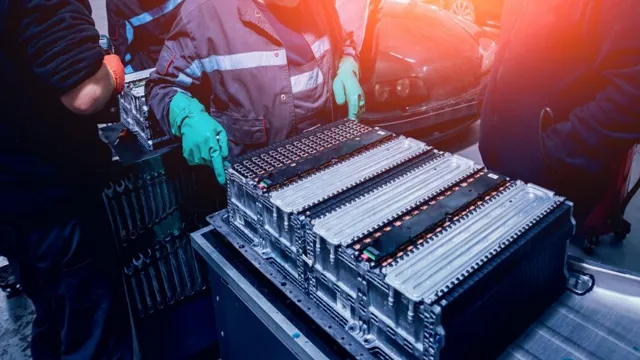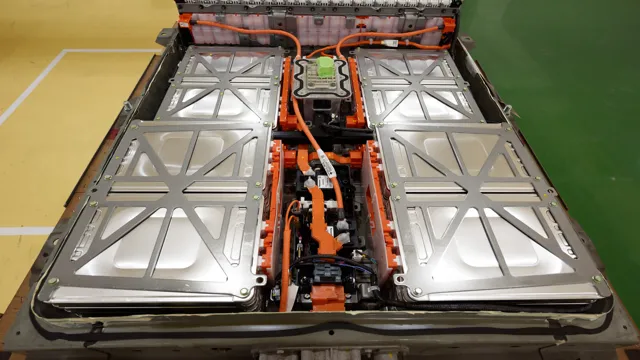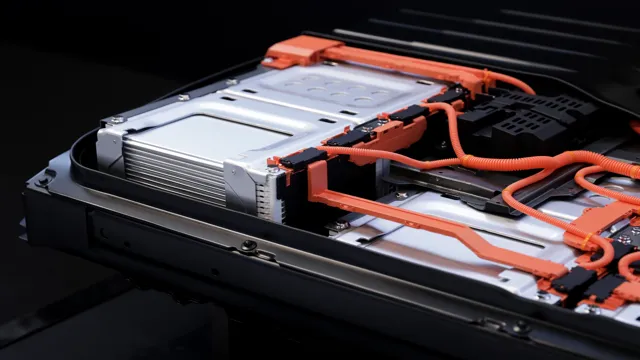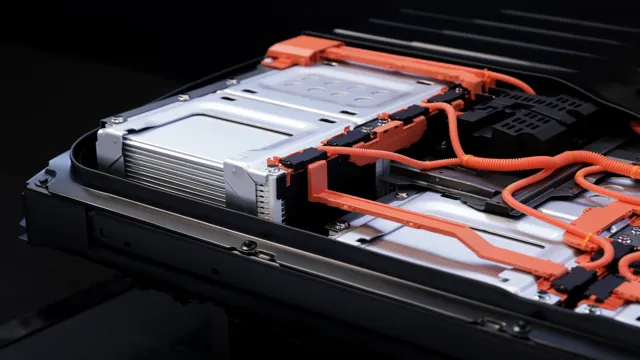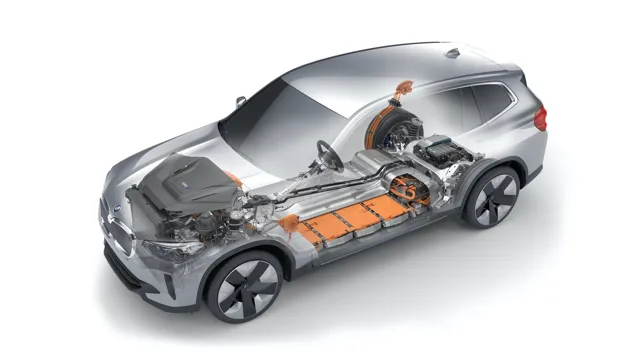Charging Forward: Exploring The Latest Developments in Electric Car Battery Progress
Electric cars are steadily progressing with the help of technological advancements in the automobile industry, especially with electric car batteries. With electric cars gaining popularity, a major concern was the limited range of the battery and slow charging times that made them unsuitable for long-distance journeys. However, with the evolution of electric car battery technology, things are changing.
Manufacturers are striving to find ways to improve the performance of the battery, increase its capacity, and reduce charging times. Several companies have worked on developing solid-state batteries that provide higher energy density and faster charging times. Furthermore, lithium-ion batteries have undergone improvements that could double their capacity, making them an ideal replacement for gas vehicles.
The rise of electric vehicle (EV) sales has also allowed battery costs to decrease, making them more affordable for a wider audience. Moreover, funding has been made available by governments to aid research and development, which has boosted innovation in the field. The advancements in the technology surrounding electric car batteries have given hope to the industry and made electric vehicles a more practical mode of transportation.
In conclusion, the progress made in the electric car battery industry is remarkable. The improvements in the technology will allow the adoption of electric vehicles to increase, thus reducing carbon emissions and increasing the sustainability of the automobile industry.
Overview of Electric Car Battery Development
The exponential growth of the electric car industry has prompted significant advancements in electric car battery technology. In the past, electric cars struggled with limited driving ranges and long recharging times, but thanks to recent progress in battery development, those issues are becoming a thing of the past. Manufacturers are focusing on enhancing battery capacity, reducing charging times, and increasing the longevity of electric car batteries.
Lithium-ion batteries have revolutionized the industry, as they are smaller, lighter, and more efficient than older battery technologies. Additionally, solid-state batteries are gaining popularity due to their higher energy density and improved safety. With continued development and innovation, electric car batteries will undoubtedly become more affordable, energy-efficient, and readily available, making electric cars an even more practical option for consumers.
Rise of Lithium-Ion Batteries
The rise of lithium-ion batteries has been a game-changer in the world of electric cars. These batteries are more efficient and powerful than traditional lead-acid batteries, which makes them a popular choice for powering the electric motors of electric vehicles. The development of electric car batteries has come a long way, from the early days of lead-acid batteries to the current era of lithium-ion technology.
Lithium-ion batteries are lighter, smaller, and have a longer lifespan than their predecessors. This means that electric cars can go further on a single charge and their batteries last longer. The development of lithium-ion batteries has allowed electric cars to enter the mainstream, as they are now more affordable and practical than ever before.
With the demand for electric cars increasing, the development of batteries will continue to evolve, and we can expect newer, more efficient, and powerful batteries to hit the market in the future.

Advancements in Battery Capacity
Electric Car Battery Development Electric car battery development has come a long way in recent years, and advancements in battery capacity have been instrumental in making electric vehicles more accessible to consumers. In the early days of electric cars, the batteries were large, heavy, and had a limited range, which made them impractical for everyday use. But today, lithium-ion batteries have become the standard for electric vehicles, and they offer far greater energy density and capacity than older battery technologies.
In fact, some of the latest electric cars can travel over 400 miles on a single charge, which is a significant improvement from even a few years ago. As technology continues to improve, it’s likely that electric car batteries will become even more efficient, further reducing range anxiety and making electric vehicles more accessible to a wider range of consumers. These advancements are essential for the future of sustainable transportation, and electric car battery development will play a critical role in reducing our reliance on fossil fuels and transitioning to a more environmentally friendly transportation system.
Current State of the Electric Car Battery Industry
The electric car battery industry has made tremendous progress in recent years, with ongoing innovations in battery technology leading to improved performance, longer life, and reduced costs. With the increased popularity of electric vehicles, manufacturers are investing heavily in research and development to develop more efficient and long-lasting batteries. The development of solid-state batteries is one of the most exciting breakthroughs in this field, as they promise to be lighter, more energy-dense, and safer than their liquid counterparts.
Additionally, advancements have been made in battery recycling, with the aim of reducing waste and preserving rare materials. As we continue to push for cleaner and more sustainable forms of transportation, the progress made within the electric car battery industry will undoubtedly play a critical role in shaping the future of mobility.
Tesla’s Dominance in Electric Car Battery Technology
Electric car battery technology has come a long way over the past decade, with Tesla leading the way in innovation and dominance. Their use of lithium-ion batteries has set the standard for other companies in the industry, with Tesla continuously improving upon and advancing their battery technology. In fact, Tesla has set itself apart by being the first electric car company to produce a vehicle with over 300 miles of range on a single charge.
This achievement alone speaks volumes about the level of research and development Tesla has invested in their battery technology. As the demand for electric vehicles continues to grow, it is evident that Tesla’s dominance in the electric car battery industry will likely continue and inspire other companies to step up their game.
Other Major Players in the Industry
When it comes to the electric car battery industry, Tesla is certainly a major player, but they aren’t the only one. Other companies, such as LG Chem, Panasonic, and CATL, have also established themselves as key players in the market. LG Chem provides batteries to automakers like General Motors and Hyundai, while Panasonic partners with Tesla to produce its batteries.
CATL, a Chinese company, has also made significant contributions to the industry and has been named the top global EV battery supplier for the past four years. These companies, along with several others, are all working to advance the technology and reduce costs to make electric cars more affordable and accessible. While Tesla may be the most well-known name in the industry, it’s important to recognize the collaborative efforts of multiple companies that are driving the development of electric car batteries.
Global Electric Car Sales and Battery Trends
As the demand for electric cars increases, so does the need for advanced battery technology. The current state of the electric car battery industry is focused on developing batteries that provide longer ranges, faster charging times, and improved durability. Manufacturers are investing heavily in research and development of new types of batteries, such as solid-state batteries, that have the potential to revolutionize the industry.
The major players in the industry, including Tesla, LG Chem, and Panasonic, are competing to produce batteries with the best performance and at the lowest cost. Consumers are also becoming more educated about the importance of battery technology when considering purchasing an electric car. As a result, we are seeing a trend towards higher capacity batteries, which allow for longer ranges and more miles per charge.
The industry is rapidly evolving, and it’s an exciting time for electric car enthusiasts as we witness the development of breakthroughs in battery technology.
Future of Electric Car Batteries
The electric car battery progress has been a hot topic lately, with many companies investing in research and development for more efficient and affordable batteries. The future looks promising, with the potential for increased driving ranges and shorter charge times. One promising technology is solid-state batteries, which use a solid electrolyte instead of a liquid one, resulting in higher energy density and safety.
Another development is the use of silicon in anodes, which can increase battery capacity by up to ten times compared to current graphite-based anodes. However, there are still some challenges to overcome, such as cost and scalability, before these advancements become widely adopted. Nonetheless, the electric car battery industry is on the cusp of a significant breakthrough, paving the way for a cleaner and more sustainable transportation future.
Emerging Technologies in Development
Electric car batteries are constantly evolving, and the future looks promising. New technologies are being developed to produce batteries that are more efficient, cost-effective, and sustainable. One promising technology is the solid-state battery, which uses a solid electrolyte instead of a liquid one.
This design reduces the risk of explosions, increases energy density, and improves the overall longevity of the battery. Another advancement is the use of silicon anodes, which can store up to ten times more energy than conventional graphite anodes. Additionally, researchers are exploring various materials such as lithium-sulphur and lithium-air to improve energy storage capabilities even further.
These emerging technologies are paving the way for the next generation of electric car batteries, offering more power, longer driving ranges, and overall better performance. As the demand for electric vehicles continues to grow, these advancements in battery technology will play a critical role in shaping the future of transportation.
Impact on the Environment and the Automotive Industry
The future of electric car batteries is a topic of great concern, especially in terms of their impact on the environment and the automotive industry. While electric cars offer a promising alternative to fossil fuels, battery production and disposal pose some environmental challenges. However, the good news is that scientists are actively working on improving battery technology, thereby making them more efficient, environmentally friendly, and affordable.
One potential solution is the use of solid-state batteries. These batteries use a solid electrolyte instead of a liquid one, which makes them safer, faster-charging, and longer-lasting. Another promising technology is the use of silicon anodes, which increase energy density, leading to a lighter and more powerful battery.
These developments are game-changers and may soon enable electric cars to travel farther and charge faster, ultimately making them more accessible to everyone. It is exciting to imagine a future where every car on the road is electric, emission-free, and powered by sustainable battery technology.
Conclusion
In the world of electric cars, battery progress has been electrifying. From the humble lead-acid battery to the powerful lithium-ion batteries we see today, the technology has charged forward at lightning speed. We’ve witnessed increased range, faster charging times, and improved efficiency.
But this journey is far from over as researchers and engineers continue to spark new ideas and innovations that will undoubtedly revolutionize the industry. So, buckle up and get ready for a ride that’s sure to be electrifying!”
FAQs
How has the progress in electric car battery technology impacted the automotive industry?
The progress in electric car battery technology has significantly impacted the automotive industry as it has led to the development of more efficient and affordable electric vehicles that are environmentally friendly.
What are some of the major challenges faced in the development of electric car batteries?
The major challenges faced in the development of electric car batteries include increasing their energy density, improving their longevity, and reducing their cost.
How does the range of electric cars compare to that of traditional gasoline-powered cars?
The range of electric cars has significantly improved in recent years, with some models even offering a range of over 300 miles on a single charge. However, it is still lower than that of traditional gasoline-powered cars, which can travel hundreds of miles on a full tank of gas.
What are some of the latest advancements in electric car battery technology?
Some of the latest advancements in electric car battery technology include solid-state batteries, which promise higher energy density, faster charging times, and increased safety, and lithium-sulfur batteries, which are lighter and cheaper than traditional lithium-ion batteries.

